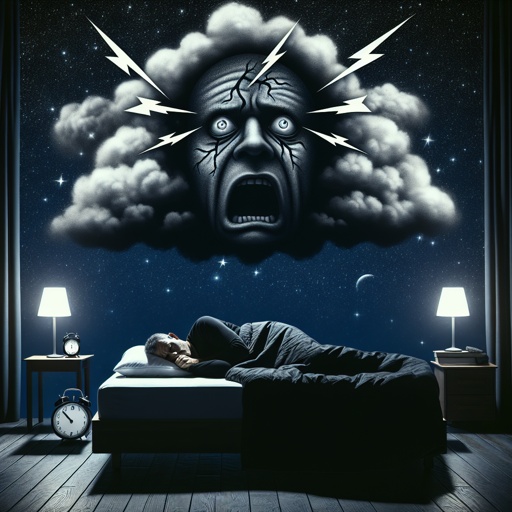Introduction to Lack of Sleep and Headaches
Scientific studies have consistently shown that missing a good night’s sleep can lead to a variety of physical and mental health issues, with headaches being one of the most common symptoms. The relationship between sleep and headaches is complex, involving various physiological processes and neurotransmitter systems that can be disrupted by poor sleep patterns. When you don’t get enough sleep, your body’s ability to regulate pain is compromised, making you more susceptible to headaches. These headaches can affect your productivity, mood, and overall quality of life. The hypothalamus—a part of the brain responsible for regulating sleep—also plays a role in headache disorders. When your sleep is disrupted, the normal functioning of the hypothalamus is affected, which can lead to headaches.
Understanding this connection is not just academic; it has real-world implications. By identifying the role that sleep plays in headache development, we can better address and manage these headaches. In the following sections, we will delve deeper into the science behind sleep-deprivation headaches, how to identify them, and effective strategies for prevention and treatment. The aim is to provide you with comprehensive insights into how improving your sleep can lead to less headaches intruding into your life.
How Lack of Sleep Leads to Headaches; The Science Behind Sleep-Deprivation Headaches
Sleep deprivation can have a significant impact on headache frequency and severity. Research has shown that inadequate sleep can increase the severity and frequency of migraines. Even just one sleepless night can lead to headaches the next day. Short-term effects of missing a night of sleep include headaches. Moreover, chronic issues like insomnia and poor sleep quality are linked to more frequent and intense sleep deprivation headaches. Those with insomnia and poor sleep often report a higher frequency and intensity of headache attacks.
The scientific community has been exploring the connection between sleep and headaches for years. One critical area of research is the role of brain chemicals and regions like the hypothalamus, which regulates circadian rhythm, sleep and arousal. The hypothalamus plays a role in the relationship between sleep deprivation and migraines due to its neurons that modulate pain. Additionally, studies have found that the risk of migraine attacks remains significantly higher in individuals with poor sleep quality compared to those who sleep well. When accounting for various factors, the risk of migraines for those with poor sleep quality is nearly four times higher than for those with good sleep quality.
The stress of inadequate sleep further exacerbates headache development, as it affects our body’s ability to manage pain effectively. When you miss out on sleep, your body’s natural pain control mechanisms are compromised, leading to an increased sensitivity to pain. Neurotransmitters, such as serotonin and dopamine, play a pivotal role in pain regulation and mood balance. These chemicals can be thrown off balance due to lack of sleep, triggering headaches or worsening existing ones.
Sleep deprivation also affects other physiological processes that contribute to headaches. For example, rapid eye movement (REM) sleep is crucial for brain recovery and processing emotional experiences. A disruption in REM sleep can lead to increased stress and emotional dysregulation, both of which are known triggers for headaches. Inadequate sleep can also cause inflammation in the body, which is a known contributor to various types of headaches, including migraines and tension headaches.
Research also suggests that poor sleep can trigger a cycle of chronic pain. Those suffering from chronic headaches often report sleep disturbances, creating a feedback loop where pain and lack of sleep reinforce each other. Breaking this cycle is essential for effective headache management and overall well-being. Understanding these scientific mechanisms helps in formulating targeted treatment and prevention strategies.
Identifying Sleep-Related Headaches
Recognizing headaches caused by lack of sleep is the first step in addressing them effectively. Symptoms often include waking up with a dull tension-type headache, which may sometimes be accompanied by a sore jaw. A sore jaw in the morning can be a symptom of teeth grinding (bruxism), which contributes to headaches. Poor sleep can also trigger full blown throbbing migraine headaches. Hypnic headaches and cluster headaches are types of nocturnal headaches, but are not triggered by poor sleep.
Obstructive sleep apnea, a condition where breathing repeatedly stops and starts during sleep, can also lead to headaches. This is one of the most common sleep problems. People with sleep apnea often wake up with headaches and feel unrested even after a full night’s sleep. These sleep-related headaches can be distinguished from other types by their timing, typically occurring upon waking, and their association with poor sleep quality. They are typically present in the morning upon waking and often fade away through the morning. However, sleep apnea can also make one more susceptible to developing a headache throughout the day.
Another key indicator is the persistence of the headache throughout the day, often exacerbated by the fatigue from not getting enough rest. Unlike other types of headaches that may come and go, these headaches often remain constant and can be particularly stubborn to treat with usual over-the-counter remedies.
Individuals with sleep disorders like insomnia are also at a higher risk of developing chronic headaches including chronic migraines. Insomnia not only reduces the total amount of sleep but also affects the quality of sleep, making individuals more prone to frequent and severe headaches.
Additionally, the type of headache pain can provide clues. For instance, tension headaches, which manifest as a tight band of pressure around the head, are commonly associated with sleep deprivation. Migraine is an intense pounding headache accompanied by nausea or sensitivity to light and sound, can also be triggered by poor sleep. Most patients with migraine will tell you that sleep loss is a major migraine trigger.
Tracking your sleep patterns and headache occurrences can offer valuable insights. Keeping a sleep diary where you note down hours of sleep, any interruptions, and the timing and intensity of headaches can help you and your healthcare provider identify patterns and correlations.
Understanding these symptoms and their links to your sleep habits is essential for managing sleep-related headaches effectively. By paying close attention to the timing, nature, and frequency of your headaches, you can better address the underlying sleep issues contributing to your discomfort.
Treatment and Prevention Strategies
Improving sleep quality with more restful sleep is one of the most effective ways to manage headaches caused by lack of sleep. Establishing a routine that includes enough sleep can lead to fewer headaches. 8 hours of sleep nightly is an optimal goal. Establishing a routine that includes enough sleep can lead to fewer headaches. This involves maintaining a consistent sleep schedule, creating a relaxing bedtime routine, and optimizing your sleep environment.
For instance, try to go to bed and wake up at the same time every day, even on weekends. Create a calming pre-sleep ritual, such as reading a book or taking a warm bath, to signal to your body that it’s time to wind down. Ensure your bedroom is conducive to sleep by keeping it dark, quiet, and cool.
In addition to lifestyle changes, there are remedies to manage headaches when they occur. Over-the-counter pain relief can be effective for mild to moderate headaches. Triptans or gepants can be used for migraines that are triggered by poor sleep. Ensure you stay hydrated, as dehydration can worsen headaches. Relaxation techniques such as deep breathing exercises, progressive muscle relaxation, and mindfulness meditation can also help alleviate headache symptoms.
For those suffering from chronic headaches, cognitive-behavioral therapy (CBT) has been shown to improve sleep quality and reduce headache frequency. CBT helps you identify and change negative thoughts and behaviors that affect your sleep.
If you suspect sleep disorders like sleep apnea or insomnia are contributing to your headaches, consult a healthcare professional for a thorough evaluation and targeted treatment plan. Undiagnosed sleep apnea can also contribute to other medical conditions such as high blood pressure, stroke, heart attack, and memory disturbances. In some cases, specialized treatments such as CPAP therapy for sleep apnea or prescription medications for insomnia may be necessary.
By addressing the underlying sleep issues, you can significantly reduce the frequency and severity of sleep-related headaches. Prioritizing good sleep habits is key to managing these types of headaches effectively.
Conclusions
Understanding the relationship between lack of sleep and headaches empowers you to make informed decisions about your health. The complex interplay between sleep and headaches underscores the importance of quality rest for overall well-being. By recognizing the symptoms of sleep-related headaches and implementing effective sleep hygiene practices, you can significantly alleviate discomfort and improve your daily life.
Investing time in establishing a consistent sleep schedule and creating a relaxing bedtime routine can help reduce the frequency and intensity of morning headaches. Simple adjustments like maintaining a dark, quiet, and cool sleep environment can make a big difference. For those experiencing chronic headaches, seeking professional help for conditions like sleep apnea or insomnia can lead to targeted treatments that address the root causes.
Incorporating relaxation techniques and staying hydrated can also aid in managing headaches when they occur. Techniques such as deep breathing, progressive muscle relaxation, and mindfulness meditation not only relieve headache symptoms but also contribute to better sleep quality. Cognitive-behavioral therapy (CBT) offers additional support by addressing negative thought patterns and behaviors that disrupt sleep.
Remember, while as needed pain medications can offer temporary relief, addressing the underlying sleep issues triggering the headaches is crucial for long-term management. If your headaches persist despite these efforts, consulting a healthcare provider can help identify specific triggers and recommend appropriate treatments.
Taking proactive steps to improve your sleep can lead to a significant reduction in headaches and enhance your overall health. Prioritizing good sleep habits is a key strategy in achieving a headache-free life and maintaining your well-being.
IF YOU HAVE HEADACHE, MIGRAINE, OR FACIAL PAIN AND ARE LOOKING FOR ANSWERS ON ANYTHING RELATED TO IT, A HEADACHE SPECIALIST IS HERE TO HELP, FOR FREE!
FIRST, LET’S DECIDE WHERE TO START:
IF YOU HAVE AN EXISTING HEADACHE, MIGRAINE, OR FACIAL PAIN DIAGNOSIS AND ARE LOOKING FOR THE LATEST INFORMATION, HOT TOPICS, AND TREATMENT TIPS, VISIT OUR FREE BLOG OF HOT TOPICS AND HEADACHE TIPS HERE. THIS IS WHERE I WRITE AND CONDENSE A BROAD VARIETY OF COMMON AND COMPLEX MIGRAINE AND HEADACHE RELATED TOPICS INTO THE IMPORTANT FACTS AND HIGHLIGHTS YOU NEED TO KNOW, ALONG WITH PROVIDING FIRST HAND CLINICAL EXPERIENCE FROM THE PERSPECTIVE OF A HEADACHE SPECIALIST.
IF YOU DON’T HAVE AN EXISTING HEADACHE, MIGRAINE, OR FACIAL PAIN DIAGNOSIS AND ARE LOOKING FOR POSSIBLE TYPES OF HEADACHES OR FACIAL PAINS BASED ON YOUR SYMPTOMS, USE THE FREE HEADACHE AND FACIAL PAIN SYMPTOM CHECKER TOOL DEVELOPED BY A HEADACHE SPECIALIST NEUROLOGIST HERE!
IF YOU HAVE AN EXISTING HEADACHE, MIGRAINE, OR FACIAL PAIN DIAGNOSIS AND ARE LOOKING FOR FURTHER EDUCATION AND SELF-RESEARCH ON YOUR DIAGNOSIS, VISIT OUR FREE EDUCATION CENTER HERE.



